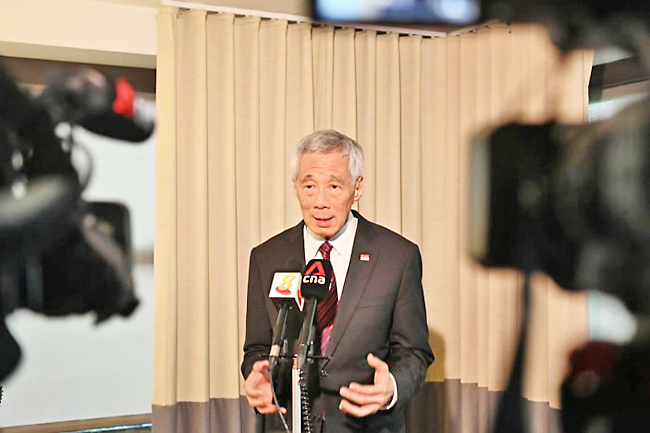CNA – Singapore took a strong stand against Russia’s invasion because it has chosen to uphold a key principle that corresponds to its long-term national interest – that is, the sovereignty and territorial integrity of all countries, said Singaporean Prime Minister Lee Hsien Loong on Friday.
This position is one that Singapore has taken “consistently” over the years, he added in a doorstop with the Singapore media after wrapping up a week-long working visit to the United States (US).
Asked what he would say to Singaporeans who may be concerned that the country is choosing sides, Lee replied, “We have chosen principles and we uphold principles which correspond to our long-term national interests, and we uphold them consistently.”
One of these fundamental principles is the non-violation of territorial integrity and sovereignty of nations, which is enshrined in the United Nations (UN) charter and is now “at stake” amid the ongoing conflict in Ukraine.
“That’s a fundamental principle which is vital to us because if that’s up for grabs, then what is our basis for saying we are entitled to exist, and to security and to be safe in the world,” said the prime minister.

“Therefore, we took a strong stand,” he added, pointing to the country’s announcement in February to impose financial sanctions and export controls on Russia.
Singapore has taken this “clear stand” consistently over the years, such as when it opposed Vietnam’s invasion of Cambodia in 1978, said Lee.
Singapore also took a stand against the US invasion of Grenada at the UN General Assembly in 1983.
“We voted against them at the UN. (It) does not mean we are the enemy of the US, but we cannot approve of what they did,” he added.
Likewise in the case of Ukraine, Singapore is “not the enemy of Russia”, the Prime Minister said in Mandarin in his response to a separate question from the media.
Singapore “cannot endorse or condone such violation of the sovereignty of another country” and has “to take a stand”, he added.
Lee also said that sanctions mark a “big step” to take for a small country like Singapore, and the hurdle is even “higher” for the country to impose sanctions on its own.
“But in this case because it is such an egregious, flagrant and major violation of the international norms and with such a major consequence for the global order, including in our region, we decided we had to act on sanctions because the UN could not act,” he said.
“The UN obviously cannot act, because you need the Security Council. The Russians are there; they have a veto (and) it is not going to pass,” added the prime minister. “But we had to stand up and be counted and we did.”
The war in Ukraine, which started on February 24, is “not over” and that both sides of the conflict are not close to reaching an arrangement that would bring about peace yet, Lee said. “And I believe that military struggle will continue,” he added.
What the crisis means for a small country like Singapore is the need to build up the country’s own defences and be well-equipped.
But most importantly, said the prime minister, is the will to fight for one’s home.
“This is my home, I am going to fight for it (and) if necessary, I’m willing to die for it,” he said. “And it is that will to defend what is yours and to defend your family and friends that keeps the Ukrainians going, and that Singaporeans must have if we are going to keep ourselves safe in this world.”
At the same time, Singapore will have to look at what is happening in the region and how other countries are reacting to the crisis.
The Prime Minister also reiterated the need for institutions to be developed in the region that can help “head off a hot conflict like this”, a point that he has made throughout his visit in the US.
There are already platforms that are helpful, such as the Asia-Pacific Economic Cooperation, the East Asia Summit, as well as the Indo-Pacific Economic Framework which is mooted by the US as a way to engage the region.
“Basically, ways to bring countries in the region together to expand their areas of cooperation and interdependence and at the same time, to provide a forum to talk about quite difficult issues, so that we can head them off before they become impossible to manage,” Lee told reporters.
“We are doing our part to encourage that, but that is something which requires many participants and to the extent that we have influence, we try to encourage other countries to go in that direction, which is one of the reasons why I am here in the US.”
Lee noted that the US has been “deeply engaged in the diplomacy and other aspects” of the conflict in Ukraine.
“They can see how things are going but at the same time, they are thinking ahead as to what could possibly be the range of outcomes and how do we manage that. And in particular, how to manage it in relation to China and the US-China relationship,” he said.
Still, the relationship between the two superpowers is “fraught”, Lee said, adding that existing communication channels may not be adequate for “very demanding” discussion topics on hand.






